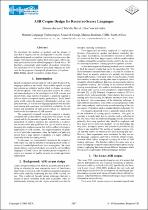JavaScript is disabled for your browser. Some features of this site may not work without it.
- ResearchSpace
- →
- Research Publications/Outputs
- →
- Conference Publications
- →
- View Item
| dc.contributor.author |
Barnard, E

|
|
| dc.contributor.author |
Davel, M

|
|
| dc.contributor.author |
Van Heerden, C

|
|
| dc.date.accessioned | 2012-02-15T14:09:00Z | |
| dc.date.available | 2012-02-15T14:09:00Z | |
| dc.date.issued | 2009-09 | |
| dc.identifier.citation | Barnard, E, Davel, M and Van Heerden, C. ASR corpus design for resource-scarce languages. 10th Annual Conference of the International Speech Communication Association (Interspeech 2009), Brighton, UK, 6-10 September 2009, pp 2847-2850 | en_US |
| dc.identifier.uri | http://hdl.handle.net/10204/5576 | |
| dc.description | 10th Annual Conference of the International Speech Communication Association (Interspeech 2009), Brighton, UK, 6-10 September 2009 | en_US |
| dc.description.abstract | The authors investigate the number of speakers and the amount of data that is required for the development of useable speaker-independent speech-recognition systems in resource-scarce languages. Their experiments employ the Lwazi corpus, which contains speech in the eleven official languages of South Africa. They find that a surprisingly small number of speakers (fewer than 50) and around 10 to 20 hours of speech per language are sufficient for the purposes of acceptable phone-based recognition. | en_US |
| dc.language.iso | en | en_US |
| dc.publisher | ISCA | en_US |
| dc.subject | Accurate speech recognition (ASR) | en_US |
| dc.subject | Lwazi | en_US |
| dc.subject | Resource scarce languages | en_US |
| dc.subject | Corpus design | en_US |
| dc.title | ASR corpus design for resource-scarce languages | en_US |
| dc.type | Conference Presentation | en_US |
| dc.identifier.apacitation | Barnard, E., Davel, M., & Van Heerden, C. (2009). ASR corpus design for resource-scarce languages. ISCA. http://hdl.handle.net/10204/5576 | en_ZA |
| dc.identifier.chicagocitation | Barnard, E, M Davel, and C Van Heerden. "ASR corpus design for resource-scarce languages." (2009): http://hdl.handle.net/10204/5576 | en_ZA |
| dc.identifier.vancouvercitation | Barnard E, Davel M, Van Heerden C, ASR corpus design for resource-scarce languages; ISCA; 2009. http://hdl.handle.net/10204/5576 . | en_ZA |
| dc.identifier.ris | TY - Conference Presentation AU - Barnard, E AU - Davel, M AU - Van Heerden, C AB - The authors investigate the number of speakers and the amount of data that is required for the development of useable speaker-independent speech-recognition systems in resource-scarce languages. Their experiments employ the Lwazi corpus, which contains speech in the eleven official languages of South Africa. They find that a surprisingly small number of speakers (fewer than 50) and around 10 to 20 hours of speech per language are sufficient for the purposes of acceptable phone-based recognition. DA - 2009-09 DB - ResearchSpace DP - CSIR KW - Accurate speech recognition (ASR) KW - Lwazi KW - Resource scarce languages KW - Corpus design LK - https://researchspace.csir.co.za PY - 2009 T1 - ASR corpus design for resource-scarce languages TI - ASR corpus design for resource-scarce languages UR - http://hdl.handle.net/10204/5576 ER - | en_ZA |






